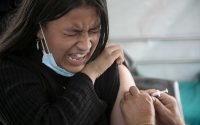U.S. CDC backs COVID-19 boosters for high-risk adults, workers, older Americans
(Reuters) -The U.S. Centers for Disease Control and Prevention (CDC) on Friday backed a booster shot of the Pfizer/BioNTech COVID-19 vaccine for Americans aged 65 and older, adults with underlying medical conditions and adults in high-risk working and institutional settings.
The decision by CDC Director Rochelle Walensky is aligned with the U.S. Food and Drug Administration’s authorization of the shot earlier this week and follows an August announcement of a broad booster rollout from her and other top U.S. health officials.
The CDC recommendation cleared the way for booster shots to start on Friday. Walgreens Boots Alliance and Walmart Inc said on Friday that boosters were available immediately for eligible individuals. They will also be rolled out in long-term care facilities and vaccination centers.
Walensky’s decision broke from a recommendation on Thursday by a group of expert outside advisors to the agency who had said that a narrower group of people should receive the extra shot. The CDC director is not obliged to follow the advice of the panel.
“This was a scientific close call. In that situation, it was my call to make,” she told reporters at a White House briefing here.
The advisory panel specifically excluded people in high-risk jobs and those in close living conditions due in part to concerns about a rare heart inflammation side effect that has occurred primarily in younger men. They were also concerned the recommendation would be too broad to implement effectively.
Walensky said the policy protects healthcare and frontline workers as well as religious and ethnic minority communities disproportionately impacted by the pandemic.
“Many of our frontline workers, essential workers, and those in congregate settings, come from communities that have already been hardest hit,” she said. “It was a decision about providing rather than withholding access.”
The panel did recommend boosters for older people and some with medical conditions that put them at higher risk of severe COVID-19.
The authorization opens boosters to more than 20 million people who received their second Pfizer/BioNTech shot more than six months ago.
The CDC on Thursday told its advisers that there would be no requirements to submit documentation to prove that people have the underlying conditions or work in at-risk settings.
Scientists have been divided over the need for COVID-19 vaccine boosters, with some including those from the FDA and the World Health Organization saying there is inadequate evidence that they are needed by anyone other than older people and that priority should be given to people around the world who have yet to receive a first shot.
Pfizer and U.S. health officials have argued here that the boosters prevent hospitalizations and deaths and that emerging data indicates they can slow mild infections as well.
The highly transmissible Delta variant of the coronavirus has driven a surge in COVID-19 cases in the United States that peaked on Sept. 1 and has since fallen about 25% to just over 120,000 cases per day, based on a 7-day moving average.
Top U.S. infectious diseases expert Dr. Anthony Fauci has said the country needs to get down to around 10,000 cases a day to see an end to the health crisis in the United States.
‘ANYONE CAN SHOW UP’
SVB Leerink analyst Geoffrey Porges said he expects many of the “worried well” to seek booster shots in the coming weeks because of the CDC’s loose requirement on who is eligible.
“That literally means anyone can show up and say I’m at an increased risk of getting re-infected,” Porges said.
The United States had authorized extra shots for those with compromised immune systems last month and around 2.3 million people have already received a third shot, according to the CDC.
Because the FDA has not yet considered Moderna’s application for boosters and Johnson & Johnson has not yet applied for one, Pfizer is likely to benefit, he said.
Pfizer shares were down less than 1% on Friday, while Moderna shares fell 5%.
Bernd Salzberger, head of infectiology at Regensburg University Hospital in Germany, said given uncertainty over the durability of protection, experts could easily come to different conclusions over who should be eligible for boosters and when.
The CDC said people 65 years and older should get a booster and also recommended the shots for all adults over 50 with underlying conditions, such as cancer or diabetes.
It said, based on individual benefits and risks, 18- to 49-year-olds with underlying medical conditions may get a booster, and also people 18 to 64 at increased risk of exposure and transmission due to occupational or institutional settings.
The CDC said about 26 million people would now be eligible for a Pfizer/BioNTech booster, including 13 million aged 65 or older.
William Schaffner, an infectious disease expert at Vanderbilt University Medical Center, said the shots will be widely available under this policy.
“I’m skeptical that locations will be overwhelmed, but there may be some locations, particularly in high-income neighborhoods, where they might get a lot of people interested,” Schaffner said.
Source: Read Full Article


